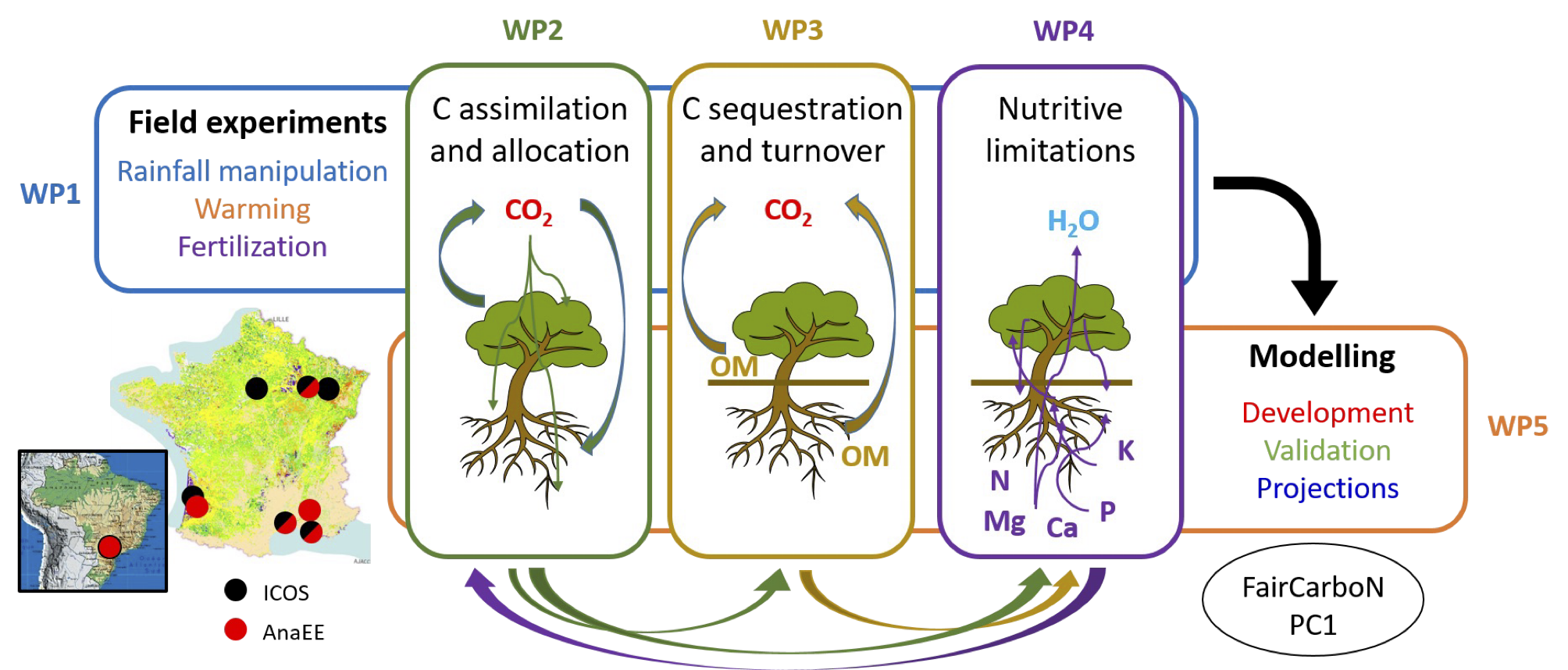Drought ForC: Drought impacts on carbon stocks and fluxes in forest ecosystems: experiments and modeling
Funding: PEPR FairCarboN
Partners: CEFE (CNRS Montpellier), IMBE (Université Aix-Marseille), ESE (Université Paris-Saclay), BEF (INRAE Nancy), URFM (INRAE Avignon), RECOVER (INRAE Aix-Marseille), ISPA (INRAE Bordeaux), Silva (INRAE Nancy), Eco&Sols (CIRAD Montpellier). Coordinated by Jean-Marc LIMOUSIN (CEFE)

Forests are both strongly impacted by the on-going climate change and at the heart of the mitigation strategies, thereby urging the scientists and forest managers to better anticipate how the forest carbon cycle will be affected under future climate. In Drought-ForC, we identify three main scientific issues that are currently limiting our understanding of climate change effects on forest’s carbon sequestration. The first one relates to the allocation of carbon among the different tree organs and the link between carbon photosynthetic assimilation and sequestration in perennial tree biomass. The second one relates to the degradation of organic matter and the sequestration of soil organic carbon under the antagonist effects of warming and soil drying. The third issue relates to the interactive effects of water and nutrient limitations for tree growth and forest functioning.
We aim at tackling these three scientific issues by uniting in a common research consortium all the French forest experimental sites that use eddy covariance carbon fluxes measurements or in situ rainfall manipulation experiments within the research infrastructures ICOS and AnaEE, together with a wide and representative panel of process-based models simulating forest functioning. Our objectives are to use concurrently the existing research infrastructures and datasets, new targeted experiments and measurements, and a wide variety of modeling approaches in order to improve our knowledge of drought response mechanisms in forests, our quantification of drought impacts on forest C cycling, and our projections of future climate change effects on the forest C sink.
The project is organized into three topical work packages (WP2 on carbon assimilation and allocation, WP3 on organic matter degradation and soil carbon sequestration, and WP4 on nutrient limitations) designed to address scientific knowledge gaps, and embedded in two transversal work packages (WP1 on the integration of experimental infrastructures, and WP5 on the comparability and robustness of model projections) designed to improve, compare and integrate the available tools to study these questions, namely the field experiments and the process-based models. WP1 will aim at homogenizing experimental protocols and datasets among experimental sites and building the first soil warming experiments in French forest ecosystems. WP2 will investigate the linkage between carbon assimilation and growth, and how assimilated carbon is allocated to the different tree organs (above- or below ground, perennial or short-lived) because this affects the carbon residence time in the ecosystem. WP3 will investigate the organic matter decomposition and the C storage in the soil under the effects of experimental soil drying and warming, and by considering the climate change effects on soil biological activity. WP4 will investigate the nutrient limitations to growth and photosynthesis by considering the nutrient status, the recycling of nutrients in trees and litter, and the nutrient immobilization in relation to C stock. WP5 will aim at validating model’s predictions on experimental data, projecting forest responses under future climate and improving the modeling of nutrient limitation.
This ambitious federating project will rely on eight emblematic research sites representing contrasting French forest ecosystems (5 of which are in ICOS and 4 in AnaEE), 12 process-based models encompassing different spatial and temporal scales and processes, and the work of 25 researchers from ten different laboratories. It is designed to favor the transfer of data and ideas from field observations to mechanistic and predictive models, and it will foster the integration of the French research community interested in forest functioning.